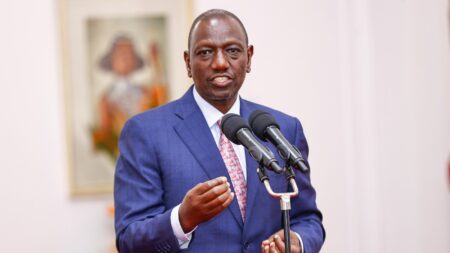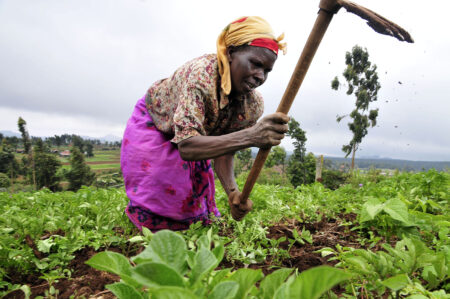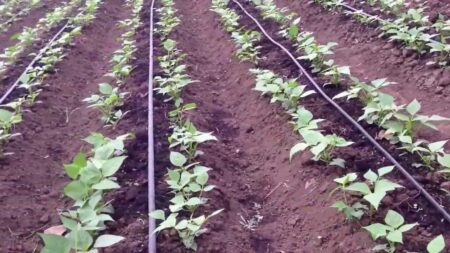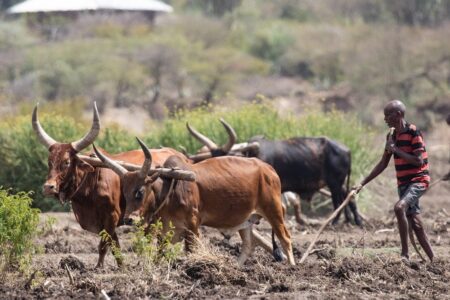- Africa’s new dawn: the rising role of digital and AI in agriculture
- Can Dangote Refinery Transform Africa Energy Ambition
- Gallup Survey: 80 per cent of Kenyan Workers Are Disengaged and Seek New Opportunities
- Madagascar Man Freed from 5KG Tumor After 15-Year Struggle
- How women in Africa are perceived and treated
- Sugar consumption in Kenya to Increase to 1.23 Million Tonnes
- Can Somalia and Turkey Oil deal Bring Change in Somaliland
- Remittances to Kenya dropped to $371.6 million in June, marking a six month low
Browsing: agricultural productivity
- Since ascending to office in September 2022, President Ruto has remained relentless in his bid to boost Kenya’s agricultural productivity.
- Agriculture remains the bedrock of the country’s development and the key to creating equitable and sustainable growth for its citizens.
- President Ruto has focused on implementing policies and programs to enhance productivity, improve farmers’ incomes, and ensure food security.
Agriculture as a bedrock of Kenya’s economic prosperity
Kenya has made impressive economic strides in innovation and entrepreneurship, private sector enterprise, infrastructure, and human skills development. However, agriculture remains the bedrock of the country’s development and the key to creating equitable and sustainable growth for its citizens. The importance of agriculture has been highlighted in Kenya’s Vision 2030
Moreover, research has demonstrated that agriculture remains a major driver of economic prosperity for most African countries. In addition to driving economic growth, agriculture creates jobs for most rural communities and is essential …
Governments can play a crucial role in enhancing agricultural productivity in Africa for economic growth. Individual nations can accomplish this by establishing policy environments to promote agricultural investment, including providing tax incentives and subsidies to producers. Governments can also prioritize agricultural development in their national budgets by allocating a more significant proportion of their resources to the sector.…
- The kit has all the basics for adaptation in rural settings; affordability, accessibility, and ease of use and maintenance.
- This micro-irrigation kit brings much needed watering solution in arid and semi-arid regions as well as in the highlands where access to water can be limited.
- The project has already reached some 4,275 micro-investors operating across 115 savings and loan groups
A low-tech micro-irrigation solution is providing high impact results for thousands of farmers in Tanzania.
The tech is a small irrigation gear referred to as a micro-irrigation kit that has been introduced to farmers in Tanzania’s Southern regions like in the Kigoma Region.
The kit has all the basics for adaptation in rural settings; affordability, accessibility, and ease of use and maintenance.
This micro-irrigation kit brings much needed watering solution in arid and semi-arid regions as well as in the highlands where access to water can be limited.
The irrigation …
Africa’s human development cannot proceed until the first and most basic need—food—is met. A report by AusAID titled Improving food security in Africa reveals that over two-thirds of the population relies on agriculture for income and basic food needs. With food, fuel, and fertiliser crises that have followed the extended Russia-Ukraine crisis, the World Bank has described the current conditions in sub-Saharan Africa as “the perfect storm,” which includes the COVID-19 pandemic, skyrocketing inflation, a growing debt burden, and harsh weather.
The World Food Programme’s 2022 Global Report on Food Crises estimates that 140 million people across Africa are experiencing food insecurity on a regular basis.
With many countries facing food security issues, many nations have partnered with the World Bank to implement a series of short-, medium-, and long-term actions to combat the effects of food insecurity, such as overreliance on imports and persistent drought. These measures are also …








